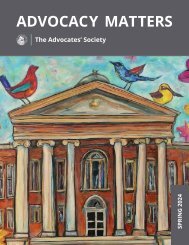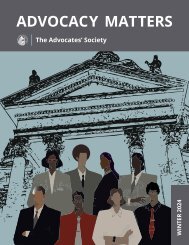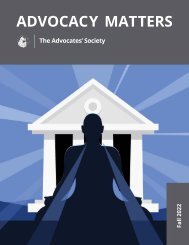Keeping-Tabs-Summer-2023
Stay up-to-date on news and events from our Young Advocates' Standing Committee (YASC) with Keeping Tabs.
Stay up-to-date on news and events from our Young Advocates' Standing Committee (YASC) with Keeping Tabs.
Create successful ePaper yourself
Turn your PDF publications into a flip-book with our unique Google optimized e-Paper software.
CASE BRIEF<br />
Court of Appeal tells Regulators to<br />
Pony Up for Disciplinary Proceedings<br />
The new cost of self-regulation after Jinnah v<br />
Alberta Dental Association and College<br />
Brynne Harding, Bennett Jones LLP, and Tyler Mc-<br />
Donough, Bennett Jones LLP<br />
duct; (ii) is a serial offender; (iii) has failed to cooperate<br />
with investigators; or (iv) has engaged<br />
in hearing misconduct.<br />
In establishing the presumption, the Court<br />
took notice of publicly available financial statements<br />
of the College, concluding that the new<br />
rule would have “marginal, if any” impact on<br />
the College’s financial position. Of interest, this<br />
evidence had not formed part of the appeal record<br />
and the parties had not been invited to<br />
make submissions on the financial impacts. As<br />
Alberta’s professional colleges vary in size and<br />
financial means, the new presumption may affect<br />
some more than others.<br />
The Supreme Court of Canada denied the<br />
College’s application for leave to appeal.<br />
Impacts on Self-Regulated Professional<br />
Organizations<br />
The breadth of Jinnah’s application to professional<br />
regulators in Alberta and beyond is unsettled.<br />
The Court indicated that its framework<br />
applies to all professionals regulated by the Alberta<br />
Health Professions Act. Outside of healthcare,<br />
some regulators have rejected the decision,<br />
contending that it does not govern their<br />
statutory mandate (e.g., Law Society of Alberta<br />
v Beaver).<br />
With its holding that the profession as a whole<br />
should presumptively bear the cost of misconduct<br />
proceedings, except where one of the four<br />
categories of “compelling reasons” applies, the<br />
Jinnah decision may discourage regulators<br />
from pursuing disciplinary proceedings. This<br />
may, in turn, encourage informal resolution of<br />
complaints, which would be less costly, but can<br />
also create a prejudicial disciplinary history for<br />
professionals. Fewer or smaller costs awards<br />
may also mean fewer appeals by professionals<br />
from hearing decisions against them.<br />
Regulators should stay up to date on the<br />
evolution of the four categories of “compelling<br />
reasons” to award costs, and how the decision<br />
is interpreted and applied.<br />
In Alberta, punitive cost awards in administrative<br />
proceedings may be a thing of the past. In<br />
Jinnah v Alberta Dental Association and College,<br />
Alberta’s top court established a new presumption<br />
that the profession as a whole – and not individual<br />
members - should bear the costs of all<br />
but the most serious disciplinary proceedings.<br />
Overview<br />
One of Dr. Jinnah’s patients complained about<br />
her collection efforts on a $444.46 invoice for<br />
dental services. A Hearing Tribunal of the College<br />
held that the collection efforts amounted<br />
to professional misconduct and ordered Dr. Jinnah<br />
to stop practising dentistry for one month,<br />
complete a philosophy course in ethics, and<br />
pay $50,000 in costs.<br />
Dr. Jinnah sought an administrative appeal,<br />
through which the Appeal Panel quashed the<br />
one-month suspension and reduced the hearing<br />
tribunal costs award to $37,500, covering<br />
just 20% of the College’s hearing costs. Pursuant<br />
to a statutory right of appeal, Dr. Jinnah appealed<br />
to the Alberta Court of Appeal.<br />
The Decision<br />
The Court of Appeal set aside the $37,500 costs<br />
award and held that it was so large as to have<br />
become the primary sanction for Dr. Jinnah’s<br />
misconduct. This was a reviewable error, applying<br />
the longstanding principle that costs<br />
awards are designed to indemnify and not to<br />
punish. The Court had counseled restraint in<br />
past cases, but had stopped short of establishing<br />
a rule.<br />
Curtailing the discretion to award costs, the<br />
Court created the new presumption that “the<br />
profession as a whole should bear the costs in<br />
most cases of unprofessional conduct”. Four<br />
types of “compelling reasons” could justify a<br />
departure from the presumption: a member<br />
(i) has committed serious unprofessional con-<br />
6 7

















